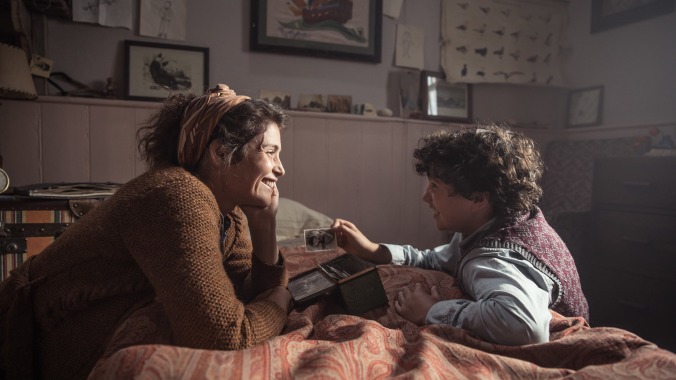Jessica Swale’s debut feature Summerland, set in a village in the English county of Kent during World War II, is one of those sapfests that flatters our modern attitudes by introducing them to our primitive ancestors. The past is reeducated and happy endings are possible. Never mind that our own reality isn’t a very happy one, or that its improvements over earlier eras when all clothing seemed to be made of wool were not the result of an increasing supply of empathy. It has brought us here, to better representation in dull, lottery-funded British dramas.
Because in many respects, the film is a conventional piece of rural saccharine, populated with kindly schoolmasters, free-range children, and old ladies whose expressions of disapproval and shock are familiar from many movies about the English countryside. On the outskirts of this community lives Alice (Gemma Arterton), a lesbian folklorist who wants to be left alone. One day, one of her neighbors shows up with Frank (Lucas Bond), a curly-haired boy who’s been evacuated from London and is now to be housed in her cottage. His father is an RAF pilot; his mother has stayed behind in the city.
This is a surprise to Alice, who never goes to village committee meetings, and hasn’t read her mail because the local kids—who imagine she’s a witch or a Nazi spy—keep stuffing branches in her letterbox. Her reaction is coldhearted: She doesn’t want the boy living with her. Things don’t improve when she’s told that it will take at least a week to find a new home for Frank. Alice hands him a couple of potatoes and cut of raw meat for dinner and tells him to cook it himself, then later informs him that heaven doesn’t exist.
But really, her humorless demeanor is a long-term side effect of heartbreak over her relationship with Vera (Gugu Mbatha-Raw), which we see in flashbacks to the 1920s and ’30s in which women in costume-store cloche hats and feather boas do the Charleston. Alice starts to bond with Frank after telling him about her theory that a local legend about a phantom island is in fact a recurring mirage known as a Fata Morgana—a phenomenon that only he seems able to see. However, this is not a story about the way children can mistake the escapist fantasies of grown-ups for magic (in the vein of, say, Jordan Scott’s Cracks).
The fact that Summerland opens with an older Alice (Penelope Wilton) pounding away at a typewriter in the 1970s should be enough to warn us that we are headed for a sentimental epilogue. Sad things happen, followed by a twist that, while not nearly dumb enough to earn comparisons to the oeuvre of Nicholas Sparks, is of a piece with the movie’s across-the-pond equivalent to the old barns, tree swings, and overall desktop wallpaper imagery of Sparksiana: cliffs, greenery, little footpaths. There’s nothing unpleasant to look at in Summerland, which means that everything will turn out for the better.
Swale, who also wrote the screenplay, lets these picturesque qualities carry the movie, occasionally deploying twinkly music and slow-mo to tell us that what we are looking at is as pretty as it seems. Homophobia is addressed briefly and racism doesn’t seem to be factor. The above-average cast of adult and child actors has its charming moments, but once the plot enters the tearjerker cliché phase, it becomes clear that what we are being offered is a nostalgia that’s no different from the kind that extolls more conservative values. It’s less a new coat of paint than a varnish.









































